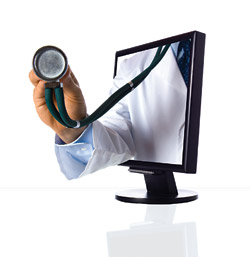
Photo: iStock
Health-care spending in the United States has been skyrocketing in recent years and is fast approaching 20 percent of the nation's Gross Domestic Product. One suggestion for saving money is to implement electronic personal health records.
With this in mind, the Friends of the National Library of Medicine (FNLM) and the National Library of Medicine (NLM) hosted a conference on the subject. Some of the nation's leading health-care experts spoke at the conference, discussing how Electronic Health Records (EHRs) could be used to save money, improve individual care, and make our national health-care system more efficient. Titled "Personal Electronic Health Records: From Biomedical Research to People's Health," the conference was in May at the National Institutes of Health (NIH) campus in Bethesda, Md.
"We believe Electronic Health Records will become as integral to medicine as the stethoscope," says Dr. David Blumenthal, national coordinator for health information technology. He is leading the Department of Health and Human Services' (HHS) effort to modernize the health-care system through the adoption of health information technology.
Says NLM Director Donald A.B. Lindberg, M.D., "For more than 30 years, the National Library of Medicine has funded research and development related to Electronic Health Records, including the Indianapolis Patient Care Network (see related story, "Electronic Health Records Place 1st at Indy 500."). Given the wide variation in U.S. health-care delivery, one size is unlikely to fit all, so it is encouraging that a variety of models is being pursued."
As the following survey of expert opinions indicates, optimism ran high at the May conference about the gains stemming from widespread adoption of Electronic Health Records:
More on the Health Records Conference Online at fnlm.org
Videos, interviews, quotes, PowerPoints, and links from the conference are online at the Friends' Web site, www.fnlm.org.
"…increasingly useful": "As we have seen information technology extremely useful in almost every other aspect of society, we will see it increasingly useful in health care."—Alfred Spector, Vice President, Research and Special Initiatives, Google
"… great decision support tools": "These are great decision support tools, and physicians and clinicians could be greatly empowered by having more information in a timely manner."—Andrew Balas, Dean, College of Health Sciences, Old Dominion University and FNLM Board Member
"… enables patients to understand": "The new technology of personalized health records enables patients to understand their conditions and participate with their health-care providers in the decisions affecting their care."—Daniel Masys, Chair, Department of Biomedical Informatics, and Professor of Medicine, Vanderbilt University Medical Center
"… people will see two benefits": "People will see two benefits. First, the doctor will know more—what medications you're allergic to, your history, the latest lab results, imaging, and so on—so we can provide good care on the spot. Second, we'll be able to aggregate the information and learn, for example, if people taking a particular drug are having any adverse consequences we hadn't known about before."—David Cutler, Otto Eckstein Professor of Applied Economics, Harvard University
"… quality and safety": "The University of Pittsburgh Medical Center is implementing an electronic health record for our patients for quality and safety."— G. Daniel Martich, MD, Professor of Critical Care Medicine, Vice President of eRecord, University of Pittsburgh Medical Center
"…helps doctors communicate": "The biggest effect is to have helped doctors communicate with other doctors, with nurses, and more recently patients. Getting the information in a central point where everybody can have it has had a big effect. You can search outside databases and do studies to understand what treatments work best. That gets published and used by everybody."—George Hripcsak, MD, MS, Chair, Department of Biomedical Informatics, Columbia University
"… more informed decisions": "As patients, we can alert our providers to any issues or questions, but also help make more informed decisions in our own interest. The cure is informed by the best evidence, your past history, not best guess."—John Perlin, Chief Medical Officer and President, Clinical Services, Hospital Corporation of America
